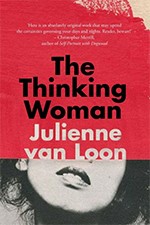 By Jo Case, Sydney Morning Herald, 5 April 2019
By Jo Case, Sydney Morning Herald, 5 April 2019
The Thinking Woman
Julienne van Loon
NewSouth, $34.99
The Thinking Woman, the first work of non-fiction by acclaimed novelist Julienne van Loon (whose career began with a Vogel win for her first novel, Road Story, in 2004) is a knotty, charismatic exploration of the intersection between ideas and lived experience, through six central themes.
At the core of the book are van Loon’s conversations with seven internationally renowned female thinkers: Laura Kipnis on love, Siri Hustvedt on play, Nancy Holmstrom on work, Helen Caldicott and Julia Kristeva (the only thinker she doesn’t interview in person) on fear, Marina Warner on wonder, and Rosi Braidotti on friendship. These conversations, which are braided with van Loon’s own reflections and reading, are interwoven with slices of memoir that speak to these themes. Constants throughout are her relationships with her current partner, her significant ex (the father of her child) and her child, and her childhood and adolescence in a regional Australian household traumatised by her father’s violence towards her mother.
Essentially, this book is a passionate meditation on the forces that shape us – structural and shared, and intimate and specific – and how we in turn shape the world and people around us. Ideas of interconnection, and identity formation as a collective, kinetic work-in-progress, are central.
“I wanted to prompt and provoke my own readers to look at what happens when we apply philosophy to our own everyday lives,” van Loon writes in her introduction. “It can lead to a radical change of attitude to things we have come to accept.”
It’s not just about applying philosophy, though: it’s also about paying attention, about forcing ourselves to see what is uncomfortable or challenging, and allowing what we see to change us.
In the first chapter, “Love”, van Loon recognises cognitive dissonance as an opportunity for discovery in her own life: a chance conversation with a colleague (incidentally, about a novel) sparks “the possibility of profound intimacy … the acute sense of vertigo that only dangerous knowledge can invoke”.
At this point, van Loon’s life epitomises adult success in middle-class Australia: a secure academic job, a mortgage, a long-term live-in relationship, co-parenting a child in one nuclear household. Her moment of uncomfortable recognition, and her choice to pay attention to it, prompts her to step outside her life and reassess it. On her long-term relationship, she reflects: “The whole episode seems impossibly passive … as if we were mere carriages on a track laid down by others.” Driven by this rupture, she deconstructs the conventions of Western 21st-century life, and how they have played out in her own experience.

Her conversations with her chosen thinkers excavate why and how we live as we do (and speculate about alternatives), drawing on the histories and vocabularies of capitalism, socialism, psychology, philosophy and feminism, and applying them to lived experience.
With the answers, she seeks to discover what a genuinely meaningful life might look like. As the book develops, she traces her own journey to rebuild her life on these revised foundations – and the costs and benefits of doing so. “At the age of 44, freedom is indeed a state one should approach with all the wits one can muster,” she wryly admits.
She acknowledges that being able to make decisions about how we live – and work – within our chosen framework, in relation to chosen values, is a privilege that requires having the resources to manage risk. At every stage, her own decisions to opt out of “the standard Australian dream narrative” impose material costs, and are made despite long-held fears (rooted in her working-class upbringing) of precarity and poverty.
Van Loon welcomes answers that lead to further questions rather than offer conclusions; leaving space for the reader to enter the conversation and acknowledging the inherent messiness of life, with its inevitable contradictions. “We write to investigate, to trace a path of understanding through complexity. But the writing can never properly encompass the intricacy, the convolutedness, of what’s really going on.”
By inviting this “convolutedness” into her pages, van Loon joins other non-fiction writers who eschew the limitations of genre and the temptation of neat conclusions, similarly inviting the reader into the meaning-making process with them, blending memoir with reading, observation and analysis. This territory has been long dominated by US publishing (and writers such as Andrew Solomon and Leslie Jamison). The Thinking Woman is part of a modest but impressive recent wave of such books in Australia, led by Maria Tumarkin (who launched this book) and Fiona Wright; as well as Jessica Friedmann, Briohny Doyle, Nicola Redhouse and Lee Kofman.
But while van Loon and her interviewees allow messiness and contradiction within their thinking, there is a rigorous overall structure to the book: when ideas repeat, they feel like deliberate thematic echoes that work to build an argument, rather than the intellectual equivalent of scattered birdseed.
Contradictions within the text are deliberate, too; an antidote to the oppositional binaries that increasingly characterise public debate and reject complex truths. For example, a chapter that critiques male violence in terms of gendered fear (with relation to her family experience, and Rosie Batty’s) also quotes Julie Kristeva’s belief that we need early intervention with the kinds of violent, alienated young men in the headlines right now; we must “insist on compassionate action, rather than recoil in collective fear”.
Each thematic chapter is introduced with a sliver of lived reflection that embodies its theme, and segues into an introduction to the profiled thinker. Van Loon works like a feature writer, framing her subjects within their workplace or home, with interesting observed details (Marina Warner, expert on myths and fairytales, “served us tea in delicate cups – her latest op shop discovery”). But her attention to detail is less the ferocious rigour of a Janet Malcolm or Lynn Barber looking for the uncomfortable revelation, and more that of a fan looking for vivid illustrative details to help realise the person she’s come to admire through deep engagement with their work. (“As Warner began to talk, her deep-seated curiosity and intelligence, along with the sheer breadth of her knowledge, impressed me once more, as has happened so often while reading her books.”)
This generous, immersive approach is channelled into the interviews, leading her subjects to reveal their own lives and vulnerabilities as they talk ideas. Provocative cultural polemicist Laura Kipnis (Against Love) tells van Loon, “my own life seems more confusing to me than other people’s”. Warner says that her writing “has been a very long therapy on myself”. Asked if she considers herself courageous, nuclear activist Helen Caldicott replies, “Other people say I’ve got courage … No, I’ve never felt brave, never.”
Van Loon is mostly successful at inviting the reader into these conversations, breaking down the works and theories she explores with her subjects for an intelligent general reader, to the point of explaining Cartesian mind/body duality and Marx’s theory of false consciousness. But occasionally her vantage point deep within the work overwhelms, particularly in the final chapter, “Friendship”.
Her conversation with feminist philosopher Rosi Braidotti, about interconnectedness and rejecting oppositional binaries in favour of a united reality that allows difference as a source of vitality, informs the book as a whole. But while the ideas are engaging, in their exploration the balance tips towards theory and away from experience, in a way that readers unfamiliar with this area may find hard to immerse themselves in.
But the imperfections in this original, agile book matter far less than what it offers. Van Loon has dared to think about how we might have serious conversations about how and why we live, invited a range of impressive thinkers to the table, and submitted her own experience as a kind of case study for application of the ideas that arise.
The result is a surprising and resonant work that cements Julienne van Loon’s status as a thinking woman well worth reading and following.
Originally published: https://www.smh.com.au/entertainment/books/the-thinking-woman-review-julienne-van-loon-on-the-forces-that-shape-us-20190329-h1cyko.html